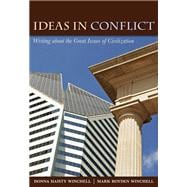
| Reading and Writing About the Great Issues | |
| Reading and Thinking Critically | |
| Understanding What You Read | |
| Annotating the Text | |
| Annotating in Practice | |
| Summarizing What You Read | |
| Summarizing in Practice | |
| Examining Rhetorical Strategies | |
| Analyzing the Context | |
| Analyzing Audience and Gauging Reactions | |
| Analyzing Structure and Genre | |
| Analyzing Language | |
| Rhetorical Strategies in Practice | |
| Writing about the Readings | |
| Responding to the Readings | |
| Explaining the Readings | |
| Exemplification | |
| Synthesis | |
| Definition | |
| Classification | |
| Cause and Effect | |
| Comparison and Contrast | |
| Process | |
| Evaluating the Readings | |
| Documenting Sources | |
| Incorporating Quoted Material | |
| Incorporating Paraphrased or Summarized Material | |
| Avoiding Plagiarism | |
| Writing in Practice | |
| Human Nature and The Cosmic Order | |
| Faith and Inquiry | |
| Genesis, Chapters 1 and 2 | |
| Muhammad, From the Koran | |
| North American Creation Myths | |
| St. Anselm, The Ontological Argument, From Proslogion | |
| William Paley, "The Watch and the Watchmaker," From Natural Theology | |
| Alfred Tennyson, From In Memoriam | |
| Charles Darwin, From The Origin of Species | |
| From The Scopes Trial (transcript) | |
| Choice and Destiny | |
| Sophocles, Oedipus, the King | |
| Thomas Hardy, The Convergence of the Twain | |
| Geoffrey Chaucer, "The Pardoner's Tale" | |
| William Shakespeare, scenes from Macbeth | |
| Fyodor Dostoyevsky, Notes from Underground, | |
| Edith Wharton, "Roman Fever" | |
| Richard Wright, From Native Son. B. F. Skinner, From Beyond Freedom and Dignity | |
| Divine Goodness and the Problem of Evil | |
| The Book of Job | |
| Boethius, From The Consolation of Philosophy, Book Four | |
| Abu Hamid al-Ghazali, From Ihya | |
| John Milton, From Paradise Lost, Book Twelve | |
| Henry Adams, From The Education of Henry Adams.Mary Baker Eddy, From Science and Health | |
| C. S. Lewis, From The Problem of Pain | |
| Viktor E. Frankl, From "Experiences in a Concentration Camp" | |
| Male and Female | |
| "The Legend of Lilith," From Alphabet of Ben Sira | |
| The Koran, Chapter Four | |
| Geoffrey Chaucer, "The Prologue and Tale of the Wife of Bath" | |
| Mary Wollstonecraft, From Vindication of the Rights of Women | |
| Simone de Beauvoir, From The Second.Yukio Mishima, "Patriotism" | |
| Alice Walker, "Roselily". Jan Morris, From Conundrum | |
| Human Nature And The Social Order | |
| The Individual and the Community | |
| Plato, From Apology (on the Death of Socrates) | |
| The Magna Charta | |
| Nicolo Machiavelli, From The Prince | |
| Thomas Jefferson, "The Declaration of Independence" | |
| Henry David Thoreau, "Resistance to Civil Government" | |
| Hannah Arendt, From The Origins of Totalitarianism | |
| Martin Luther King, Jr. "Letter from the Birmingham Jail" | |
| Joan Didion, Fixed Ideas: America After 9-11 | |
| War and Peace | |
| Homer, The Iliad, from Books VI & IX | |
| Saint Thomas Aquinas, From Summa Theologica (On Just War Theory) | |
| From "The International Agreement of the Geneva Convention" | |
| Emma LeConte, From When the World Ended | |
| Mohandas K. Gandhi, "Evidence before the Hunter Committee," From Satyagraha | |
| Mao Tse-tung, "Imperialism, Revolution, and War". John Hersey, Hiroshima, Chapter One | |
| Paul Fussell, "Thank God for the Atom Bomb" | |
| Affluence and Equity | |
| Hesiod, Works and Days | |
| Sir Thomas More, From Utopia | |
| Adam Smith, From The Wealth of Nations | |
| Karl Marx and Friedrich Engels, The Communist Manifesto | |
| Edward Bellamy, From Looking Backward | |
| Barbara Ehrenreich, From Nickel and Dimed | |
| F. A. Hayek, From The Road to Serfdom | |
| E. F. Schumacher, "Buddhist Economics" | |
| Table of Contents provided by Publisher. All Rights Reserved. |
The New copy of this book will include any supplemental materials advertised. Please check the title of the book to determine if it should include any access cards, study guides, lab manuals, CDs, etc.
The Used, Rental and eBook copies of this book are not guaranteed to include any supplemental materials. Typically, only the book itself is included. This is true even if the title states it includes any access cards, study guides, lab manuals, CDs, etc.